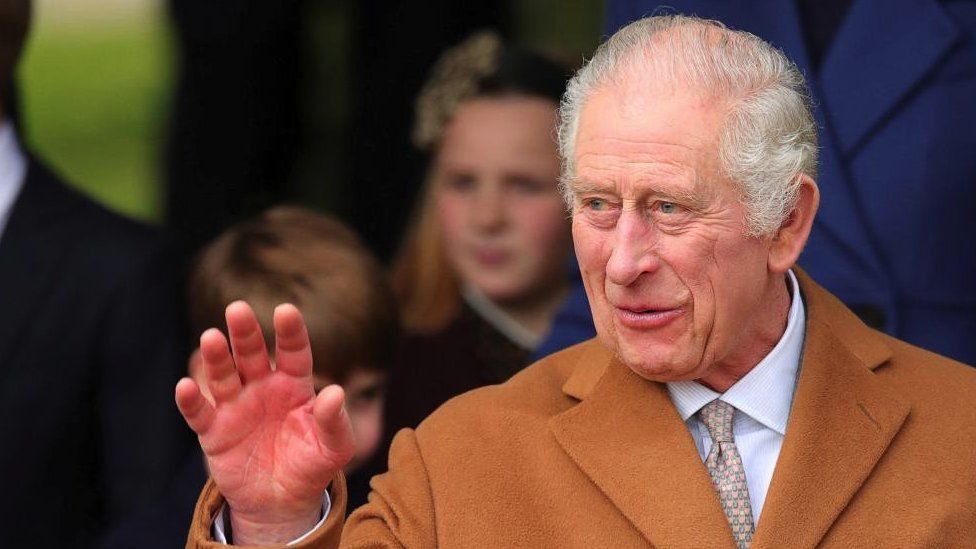What do we know about King Charles' cancer diagnosis?

Composed by Michelle Roberts and Philippa Roxby
According to Buckingham Palace, King Charles has received a cancer diagnosis of a particular kind.

He was found to have an enlarged prostate while undergoing medical care recently. The King has begun treatment and has been instructed by his doctors to avoid public engagements for now.
What Cancer Does The King Have?
The King's cancer type and treatment location haven't been disclosed by the Palace.
According to the source, he commenced a "routine of consistent therapies" on the first day of the week.
The statement declared that there is no additional information to be disclosed presently except for the confirmation that His Majesty is not suffering from prostate cancer.
Does Prostate Enlargement Treatment Cause This?
The ruler, who is 75 years old, just received treatment for a non-cancerous growth in his prostate.
Last month, he stayed at the London Clinic private hospital for three consecutive nights. This was because he had a corrective procedure done.
After receiving treatment, the Palace announced that the King will delay his public appearances "in order to have time for personal recovery".
Charles' Cancer Diagnosis: A Royal Health Update
During the treatment process, they discovered another matter that was concerning. After further examination, it was revealed that he had a type of cancer.
He will now be treated for his other condition as an outpatient.
Cancer happens when cells in a particular area of the body grow and divide in a manner that is not regulated.
These cells have the ability to propagate to different parts of the body's tissues, such as the organs, which is commonly referred to as secondary or metastatic cancer.
Diagnosing Cancer: How?
Normally, physicians begin the diagnostic process by inquiring about the manifestations you are experiencing. Additionally, they may conduct medical evaluations and tests.
It may involve taking blood tests as well as X-rays or different types of scans. On certain occasions, a small piece of tissue, referred to as a biopsy, is obtained for further examination in the laboratory.
Sometimes, such as in the case of royalty, cancer can be detected during routine medical examinations for unrelated issues.
Screening tests can lead to the diagnosis of cancer.
In the UK, people can get screened for breast, bowel, and cervical cancer. Screening for cancer involves checking for initial indications of cancer in individuals who exhibit no symptoms. Afterwards, other tests are conducted in confirming the diagnosis.
What's The Cancer Incidence Rate?
Half of the population in the United Kingdom will experience a form of cancer at some point in their life.
The NHS UK portal states that there are over 200 varying forms of cancer, with the prevalent ones in the UK being breast, lung, prostate, and bowel cancer.
Every type of cancer is identified and handled in a specific manner.
Cancer Treatments: What Are They?
There are various approaches to handle or control cancer, which primarily relies on the kind and location of the cancer.
Certain types of cancer can be eliminated through surgery, whereas chemotherapy medications can be administered intravenously or ingested as pills to eradicate cancer cells.
Radiotherapy may be provided as an alternative choice. It employs strong radiation to aim and neutralize the cancer.
Some treatments are unable to provide a cure.
Cancer Stages: What Are They?
Doctors use staging to determine the size of cancer and its spread to determine the ideal treatment for a patient.
In medical terms, the process of staging involves the utilization of numerical values. If we talk about cancer, the numerical range starts from one, which indicates that the cancer is in its early stage and hasn't spread, whereas four denotes that the cancer has reached its advanced stage and has started spreading throughout the body.
Cancer Recovery: Who Beats It?
Over the past half-century, there has been a considerable increase in the likelihood of people surviving cancer. However, the pace of progress has decreased in the more recent times.
As per the findings of Cancer Research UK, fifty percent of individuals who are diagnosed with cancer manage to stay alive for 10 years or longer despite their ailment.
The chances of surviving cancer are typically greater for individuals who receive a diagnosis before reaching 40 years of age.
Nevertheless, it has been found that the chances of surviving breast, bowel, and prostate cancers are greatest during middle age.
How To Deal With Possible Cancer?
Even though it can be intimidating, it's important to schedule an appointment with a physician and discuss any apprehensions you may have.
The indications you are going through might not indicate cancer, but it is crucial to undergo a medical examination.
Detecting cancer at an early stage frequently facilitates its treatment.
"Further Details On Story"
External sites' content is not the responsibility of the BBC.









































